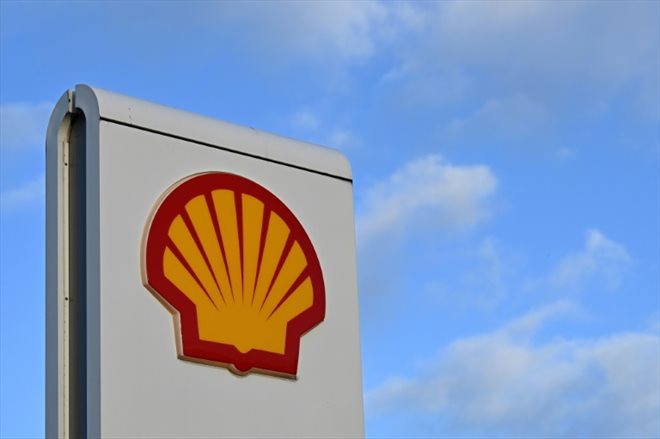The oil giant Shell is now banking on “stable” oil production until 2030, which has caused consternation among environmentalists, when it had unveiled in 2021 reduction targets of 1 to 2% per year (AFP / Archives/Paul ELLIS)
The oil giant Shell now expects “stable” oil production until 2030, which is causing consternation among environmentalists, when it unveiled in 2021 reduction targets of 1 to 2% per year.
The group is also boosting distributions to shareholders after a year 2022 of record profits in the wake of the war in Ukraine.
In a press release published on Wednesday, Shell announced that it will “stabilize its production of liquids until 2030”.
The group maintains that it has already achieved its production reduction objectives over the period.
A spokesperson for Shell, joined by AFP, underlines that the objectives for the reduction in production of black gold displayed in 2021, and based on the production of 2019, were achieved in 2022 thanks to disposals such as the sale of shale oil deposits in the United States.
“We are investing to provide the energy security that customers need”, justifies the general manager Wael Sawan, quoted in the press release.
The war in Ukraine has brought security of energy supply to the forefront of the climate emergency for many governments and companies in the sector.
In a presentation at the start of the day to investors, Mr Sawan added that “the pace of the transition from fossil fuels to low-carbon energy depends on many things, including government policies, the cost of development energy and consumer demand”.
The International Energy Agency (IEA) has also outlined for the first time a peak in global oil demand “before the end of the decade” thanks to the rise of the electric car.
Shell’s financial director Sinead Gorman argued that investments in gas would be preferred, in particular because of the lower carbon intensity of this energy compared to oil or coal, and because it was easy to transport.
– “180 degree turn” –
Shell also revealed a series of shareholder giveaways on Wednesday, with a 15% rise in the dividend per share effective in the second quarter of 2023, and share buybacks of at least $5 billion in the second half of this year.
The NGO Global Witness castigates this “180 degree turn” initiated “on the back of the energy crisis instead of accelerating green investments”.
“Like other fossil fuel giants that have also scaled back their ambitions, Shell now admits it has no plans to change its business model, incompatible with efforts ‘against’ climate collapse “, comments for its part the NGO Friends of the Earth.
The other British “major”, BP, also announced in February, on the sidelines of record results, that it intended to boost its profits by 2030 by investing more both in renewable energies, but also in hydrocarbons, slowing the pace of its energy transition.
Questioned by AFP, Simon Evans, of the Carbon Brief site, believes for his part that it is “very clear that we are not on the right track to limit global warming to 1.5 degrees” as predicted in under the Paris agreements.
He also notes that European oil companies remain “ahead of the others” and in particular their American rivals, in terms of investment in green energies.
The action took 1.44% to 2,329 pence on the stock market around 1:40 p.m. GMT.
The Berenberg bank considers that the strategy unveiled on Wednesday is “positive”, in particular the reduction of costs envisaged and that of investments, planned between 22 and 25 billion dollars per year in 2024 and 2025, including 10 to 15 billion from 2023 to 2025 in low carbon energies.
Hargreaves Lansdown analyst Derren Nathan, however, said the “long-term focus on shareholder payouts will limit the amount of capital available to invest in new” green technologies.
The title of Shell had unscrewed during the pandemic when economic activity was almost paralyzed by the confinements, and is now approaching its peaks of 2018.
Sinead Gorman, however, insisted: “we still find our stock undervalued”.
© 2023 AFP
Did you like this article ? Share it with your friends with the buttons below.




